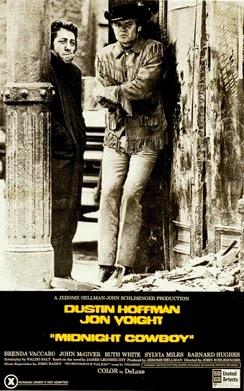
Directed By: John Schlesinger
Starring: Dustin Hoffman, Jon Voight, Sylvia Miles
Tag line: "For those who have never seen it and those who have never forgotten it"
Trivia: Dustin Hoffman kept pebbles in his shoe to ensure his limp would be consistent from shot to shot
For a brief spell in the mid ‘80s, I considered Midnight Cowboy the greatest motion picture ever made. Having discovered a copy of it at my favorite video palace (the one I told you about in my write-up of Scorsese’s Mean Streets), I was blown away by the movie’s realistic vibe, and how it so perfectly conveyed abject poverty. When my attempts to purchase a copy of my own failed (at the time, VHS copies of popular pictures cost somewhere in the neighborhood of $100, so you can imagine what a hard-to-find title like this would have set me back), I resorted to renting Midnight Cowboy over and over again (as I recall, nobody else was interested in the movie; it was always on the shelf when I went looking for it). And no matter how many times I watch it, Midnight Cowboy always moved me to tears.
Bored of his humdrum life in Texas, Joe Buck (Jon Voight), a cowboy and self-proclaimed ladies’ man, packs his bags and heads to New York City in the hopes of becoming a high-priced gigolo. After a few unsuccessful bids (the first woman he hooks up with is Cass, played by Sylvia Miles, who, despite living in a penthouse, bilks him out of $20), Joe has a chance encounter with Enrico “Ratso” Rizzo (Dustin Hoffman), a fast-talker with a bum leg who, for a small fee, agrees to set Joe up with Mr. O’Daniel (John McGiver), a guy he claims is a first-class pimp. When O’Daniel instead turns out to be an aging homosexual with a religious fixation, Joe goes looking for Ratso, who he finds in a coffee shop a few days later. Broke and with no place to go (he was recently locked out of his hotel room for non-payment), Joe reluctantly agrees to accompany the shifty Ratso back to his place: a dingy apartment situated in a condemned building. Together, the two do what they can to survive, and over time become the best of friends, but as the winter months approach, a sickly Ratso talks more and more of heading south to Florida, believing the sunshine and fresh air will cure his aliments. Will Joe raise the money in time to help his pal realize his dream, or will the city swallow them up instead?
Jon Voight brings an “aw shucks” innocence to the part of Joe Buck, whose turbulent past is revealed by way of a series of flashbacks, presented during his long bus trip to New York City. Raised by his grandmother (Ruth White), Joe was once in love with a girl named Annie (Jennifer Salt), an affair doomed to end in tragedy (In one very traumatic flashback, we watch as Joe and Annie are gang raped by a pack of thugs. Her psyche all but destroyed, a confused Annie then tells the police Joe was responsible for the assault). Moments after he reaches New York City, it’s clear Joe is completely out of his element, making him the perfect dupe for a con man like Ratso Rizzo. As played by Dustin Hoffman, Ratso is an ornery cripple with a chip on his shoulder, yet despite having spent so much time on the streets, he’s not particularly good at raising cash (he steals food as opposed to paying for it). What’s more, his health rapidly deteriorates when the cold weather sets in (to the point that he can barely walk without falling down). Two years removed from his portrayal of Ben Braddock, the affluent college student in Mike Nichols’ The Graduate, Hoffman plays an entirely different sort of character in Midnight Cowboy, and in so doing established himself as one of the era’s finest actors.
Shining just as brightly as his two stars, director John Schlesinger brings a gritty realism to Midnight Cowboy, giving the film a documentary-like feel that serves its story perfectly (many scenes look as if they were lifted from a nightly news report). By focusing his cameras on these two loners, tagging along as they traverse the harsh city streets, Schlesinger captures poverty in a way I’d never seen before, making it almost palpable; Joe eventually manages to get his hands on some money, proudly announcing he has $8 in his pocket. Even by late ‘60s standards, $8 wasn’t a lot of money, but because we’ve experienced the lows right along with him (at one point, a desperate Joe prostituted himself on a street corner, hooking up with a homosexual teenager, played by a young Bob Balaban, who, in the end, didn’t have the money to pay), we can’t help but share in his excitement. Sure, $8 won’t take them very far, but the fact that they have any cash at all is reason enough to celebrate.
While I no longer rank it as my all-time favorite movie, Midnight Cowboy is still high up on the list, and remains one of the most poignant exposés of poverty and loneliness ever committed to film.
